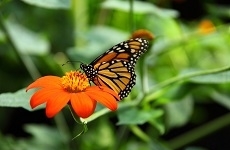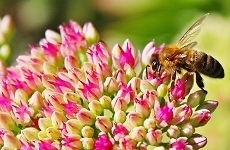Pollinators are animals that move from plant to plant while searching for protein-rich pollen or high-energy nectar to eat. As they go, they are dusted by pollen and move it to the next flower, fertilizing the plant and allowing it to reproduce and form seeds, berries, fruits and other plant foods that form the foundation of the food chain for other species—including humans. Pollinators are themselves important food sources for other wildlife. Countless birds, mammals, reptiles and amphibians eat the protein and fat-rich eggs, larvae, or adult forms of pollinators, or feed them to their young. Pollinators play a critical role in the food supply for wildlife and people!
Bees are well-known pollinators, but over 100,000 invertebrates—including butterflies, moths, wasps, flies, and beetles—and over 1,000 mammals, birds, reptiles and amphibians, act as pollinators. Pollinators worldwide are in decline. Habitat loss, invasive species, parasites, and pesticides are largely to blame. But you can help by taking the steps to earn the NWF EcoLeader Pollinator Badge!



EcoLeaders earn points towards certification by taking action in the following categories which represent the NWF EcoLeader Continuous Learning and Leadership Model:
Plan: Learn about the campaign and why it’s important to get involved
Act: Choose an action(s) you’d like to take from a list generated by the NWF campaign staff leads
Communicate: Choose a method to communicate about the campaign and the action you are taking
Energize: Choose an action to take that will help to energize and sustain your effort on this campaign
Reflect: Take time to reflect on your experience, what you have learned and how you will carry it forward in your life
Earn the badge
Bees are well-known pollinators, but over 100,000 invertebrates—including butterflies, moths, wasps, flies, and beetles—and over 1,000 mammals, birds, reptiles and amphibians, act as pollinators. Pollinators worldwide are in decline. Habitat loss, invasive species, parasites, and pesticides are largely to blame. But you can help by taking the steps to earn the NWF EcoLeader Pollinator Badge!



How It Works:
EcoLeaders earn points towards certification by taking action in the following categories which represent the NWF EcoLeader Continuous Learning and Leadership Model:Plan: Learn about the campaign and why it’s important to get involved
Act: Choose an action(s) you’d like to take from a list generated by the NWF campaign staff leads
Communicate: Choose a method to communicate about the campaign and the action you are taking
Energize: Choose an action to take that will help to energize and sustain your effort on this campaign
Reflect: Take time to reflect on your experience, what you have learned and how you will carry it forward in your life
Earn the badge
Pollinator Resources
RESOURCES:
- Learn about the plight of the Monarch butterfly
- Learn about the importance of pollinators and what NWF’s doing to help
- Read NWF’s The Campus Wild Guide to learn how schools across the country are creating pollinator habitat on their campus
- Monarch Conservation in America’s Cities: A Solutions Guide for Municipal Leaders
- Blog: Four Questions about Neonicotinoid Pesticides
Action-Related Resources:
- Help to create a migratory corridor/large landscape habitat on campus or in your community or region
- Encourage your Mayor to take the Mayor’s Monarch Pledge
- Earn NWF’s Wildlife-Friendly Certification for your campus and be counted toward the Million Pollinator Garden Challenge
- Become a "Butterfly Hero"
- Work with your campus or community place of worship to institute the faith-based Wildlife Habitat Certification program, Sacred Grounds
- Educate and engage your community including homeowners, businesses, schools and universities, places of worship, and others in creating pollinator friendly habitats on their properties while working to attain NWF’s esteemed certification as a wildlife-friendly community







